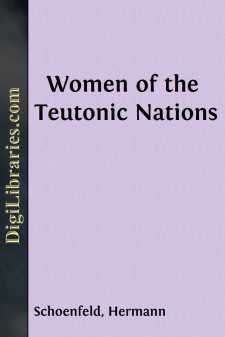Categories
- Antiques & Collectibles 13
- Architecture 36
- Art 48
- Bibles 22
- Biography & Autobiography 813
- Body, Mind & Spirit 142
- Business & Economics 28
- Children's Books 17
- Children's Fiction 14
- Computers 4
- Cooking 94
- Crafts & Hobbies 4
- Drama 346
- Education 46
- Family & Relationships 57
- Fiction 11829
- Games 19
- Gardening 17
- Health & Fitness 34
- History 1377
- House & Home 1
- Humor 147
- Juvenile Fiction 1873
- Juvenile Nonfiction 202
- Language Arts & Disciplines 88
- Law 16
- Literary Collections 686
- Literary Criticism 179
- Mathematics 13
- Medical 41
- Music 40
- Nature 179
- Non-Classifiable 1768
- Performing Arts 7
- Periodicals 1453
- Philosophy 64
- Photography 2
- Poetry 896
- Political Science 203
- Psychology 42
- Reference 154
- Religion 513
- Science 126
- Self-Help 84
- Social Science 81
- Sports & Recreation 34
- Study Aids 3
- Technology & Engineering 59
- Transportation 23
- Travel 463
- True Crime 29
Women of the Teutonic Nations
Description:
Excerpt
PREFACE
Adequately to write the history of the woman of any race would mean the writing of the history of the nation itself. There is no phase of the cultural life of any people that is not founded upon the physical and moral nature of its women. On the other hand, mental and moral heredity, both through paternity and maternity, determines the character and innermost being of woman. If we knew all the preponderating influences of heredity for ages, we could with almost mathematical accuracy compute the traits of human biology in every case. The forces of environment, tremendous though they are, modify, but do not alter in any way the original nature of man, which is established and standardized "by eternal and immutable laws." Anthropology is continuously progressing toward a firm scientific foundation, and is beginning to organize even the vast domain of psychology into a well-defined system. The interdependence between physical, mental, and moral traits is well recognized, but its exact determination is impossible, owing to the infinite complexity of the endless ancestral potencies.
So much is established, however: Teutonic woman, as she appears in history, is the product of two groups of influences, the one group, inherited nature; the other, environment; she is the exact sum of these antecedent causes. And only so far as these causes differ does the Teutonic woman differ from her sister of any other race of other times and climes.
In this book of a purely historical, literary, and cultural character must be excluded all that refers to the physiological and ethnographical characteristics of the Teutonic woman and of her Slavic sister. Nor are we concerned with the theory of their evolution, i. e., the search of the physical principles according to which the consequences of their existence are true to the laws of their antecedents. Many eminent scientists have tried their great faculties on this subject of universal interest and importance. Standard works of a scientific character, like Floss's Das Weib in der Natur und Volherhunde, abound in scientific and medical bibliography.
Our limited task is merely to deal succinctly with the most general evolution of the social position and the cultural status of the Teutonic and, even more briefly, of the Slavic woman at the various epochs of their respective histories, and how far the history of civilization among those races was influenced by them, how far the symptoms of national morality and the degree of culture were shaped by feminine achievements, proclivities, virtues, and vices. Two thousand years of the richest, almost unfathomable, history had to be traversed in the attempt to glean the essential red thread from the enormous masses of facts which in their entirety would be inaccessible even to the most universal historical scholar. Most difficult of all the periods is perhaps the question of the present and actual women's movement, which is now in its liveliest flux and in a most variable condition both in the German and in the Slavic world....


